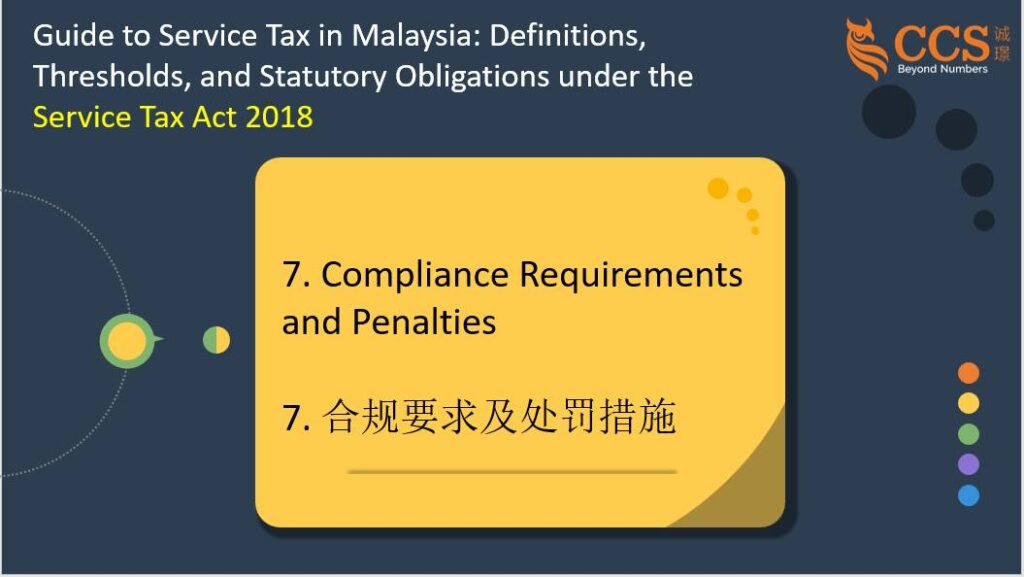
Compliance Requirements and Penalties
Effective compliance with Service Tax regulations is paramount for businesses operating in Malaysia to avoid significant penalties and ensure smooth, uninterrupted operations.
7.1 Registration Process (MySST Portal)
Businesses that are liable for Service Tax registration must initiate their application through the Royal Malaysian Customs Department’s (RMCD) official MySST portal.
Proactive registration is strongly encouraged, with a suggested deadline of August 31, 2025, for businesses affected by the latest expansions, allowing them to benefit from transitional compliance measures.
The necessary documentation for registration typically includes the business registration certificate (such as an SSM certificate), bank account details, identity documents of the business owner or directors, and relevant financial statements.
The grace period for penalties, which extends until December 31, 2025, offers a critical window for businesses to conduct thorough internal reviews, update their systems, and train staff without incurring immediate punitive consequences.
This demonstrates a pragmatic approach from the government to facilitate a smoother transition.
The explicit announcement of “no prosecution or penalties” until the end of 2025 for businesses actively taking steps to comply is a significant policy decision.
This is not merely leniency but a strategic move by the government to allow businesses sufficient time to adapt to the complex changes.
It provides a crucial opportunity for companies to accurately classify their services, monitor revenue against new thresholds, proactively register, update their Enterprise Resource Planning (ERP) and invoicing systems, adjust contracts and pricing, and train staff without the immediate threat of fines.
This approach underscores a focus on achieving long-term compliance and minimizing disruption during the transition phase.
7.2 Service Tax Return (SST-02) Submission and Payment
Service tax generally becomes due and payable at the time payment is received for the taxable service provided to the customer by the taxable person.
However, a critical rule applies: if the whole or any part of the payment is not received within a period of 12 calendar months from the date of the invoice, the service tax then becomes due on the day immediately following that 12-month period.
Registered persons are required to declare their service tax returns using Form SST-02 on a bi-monthly basis, according to their designated taxable period.
Businesses have the option to apply to the Director General for a specific taxable period that aligns with their financial year-end.
The SST-02 return must be submitted no later than the last day of the month following the end of the taxable period.
This submission is mandatory, irrespective of whether there is any tax amount to be paid for that period.
Payments can be conveniently made electronically via FPX (Financial Process Exchange) or by cheque, which can be posted to the Customs Processing Center (CPC).
The “payment received” basis for tax due, combined with the 12-month rule, necessitates robust accounts receivable management and can significantly impact cash flow planning for businesses, particularly those with extended payment terms or a high risk of bad debts.
While the primary trigger for service tax liability is the receipt of payment, which is generally beneficial for cash flow, the critical caveat is that if payment is not received within 12 months of the invoice date, the tax still becomes due.
This means a business might be obligated to remit service tax to the RMCD on revenue that has not yet been collected, or worse, on a bad debt.
This creates a potential cash flow mismatch and requires businesses to have efficient invoicing, collection, and bad debt management processes to avoid liquidity issues.
7.3 Penalties for Non-Compliance, Late Registration, and Late Payment
Failure to adhere to Service Tax obligations carries significant penalties, designed to ensure compliance and deter non-adherence.
- Late Payment Penalties: Failure to make the requisite SST payments by the due date incurs escalating penalties:
A 10% penalty is imposed on the unpaid amount for the first 30 days past the due date.
An additional 15% penalty applies for the second 30-day period.
A further 15% penalty is levied for the third 30-day period.
The maximum cumulative penalty rate for late payment can reach 40% of the unpaid tax. - Failure to Register Penalties: Failure to register for service tax when legally liable, as stipulated in Section 13(5) of the Act, constitutes a criminal offence.
This can result in severe penalties, including:
A fine of up to RM50,000.
Imprisonment for a term of up to three years.
Or both the fine and imprisonment.
The severe penalties for non-compliance, including substantial fines and potential imprisonment, underscore the high stakes involved in Service Tax adherence.
This reinforces the critical necessity of expert consultation and proactive internal compliance measures to mitigate legal and financial risks.
The penalties for non-compliance are not merely administrative inconveniences; they are significant legal and financial deterrents.
A fine of up to RM50,000 and/or three years imprisonment for failure to register clearly signals the government’s serious intent to enforce the Service Tax Act.
Similarly, late payment penalties escalating to 40% can severely impact a business’s profitability.
These high stakes make it imperative for businesses to prioritize SST compliance, invest in accurate internal systems, and, if internal expertise is insufficient, to seek professional tax advisory services as a crucial risk mitigation strategy.
7. 合规要求与处罚
严格遵守服务税法规对在马来西亚经营的企业至关重要,可避免面临重大处罚并确保业务运营顺畅无阻。
7.1 注册流程(MySST 门户)
应缴纳服务税的企业必须通过马来西亚皇家海关(RMCD)的官方 MySST 门户网站提交申请。
强烈建议受最新扩展影响的企业积极进行注册,建议截止日期为 2025 年 8 月 31 日,以便它们能够从过渡性合规措施中受益。
注册所需文件通常包括营业执照(如SSM证书)、银行账户信息、企业所有者或董事的身份证明文件以及相关财务报表。
处罚宽限期延长至2025年12月31日,为企业提供了关键窗口期,以便其进行全面内部审查、更新系统及培训员工,而无需立即面临处罚。
这体现了政府采取务实态度,旨在促进过渡期平稳进行。
明确宣布对积极采取合规措施的企业在2025年底前“不予起诉或处罚”是一项重大政策决策。
这并非单纯的宽容,而是政府为企业适应复杂变革提供充足时间的战略举措。
这为企业准确分类服务、监控收入是否达到新阈值、主动注册、更新企业资源规划(ERP)和开票系统、调整合同及定价、培训员工提供了关键机会,且无需立即面临罚款威胁。
此做法凸显了政府注重实现长期合规并尽量减少过渡期扰动的政策取向。
7.2 服务税申报表(SST-02)提交与缴纳
服务税通常在纳税义务人向客户收取应税服务款项时到期并应缴纳。
然而,有一项关键规则:如果在发票开具之日起12个日历月内未收到全部或部分付款,则服务税应在该12个月期满的次日到期。
注册纳税人需根据其指定的应税期间,每两个月使用SST-02表格申报服务税。
企业可向总监申请与财务年度末相一致的特定应税期间。
SST-02 申报表必须在应税期间结束后的下一个月的最后一天之前提交。
无论该期间是否有应纳税额,都必须提交该申报表。
税款可通过FPX(金融流程交换系统)电子支付,或以支票形式邮寄至海关处理中心(CPC)。
以“收到款项”为依据确定应缴税款,结合12个月规则,要求企业建立健全应收账款管理机制,并可能对现金流规划产生显著影响,尤其是对付款期限较长或坏账风险较高的企业。
虽然服务税的主要触发因素是收到付款,这通常对现金流有利,但需要注意的是,如果未在发票日期后 12 个月内收到付款,则仍需缴纳该税款。
这意味着企业可能有义务向马来西亚皇家海关缴纳尚未收取的收入的服务税,甚至更糟糕的是,缴纳坏账的服务税。
这可能导致现金流不匹配,企业需建立高效的开票、收款及坏账管理流程以避免流动性问题。
7.3 违规、迟延注册及迟延缴税的处罚
未履行服务税义务将面临严厉处罚,旨在确保合规并遏制违规行为。
- 逾期付款罚款:未在到期日支付应缴服务税将面临累进罚款:
逾期30天内,对未缴税款处以10%的罚款。
第二30天期间,再加收15%的罚款。
第三30天期间,再加收15%的罚款。
延迟付款的最高累计罚款可达未缴税款的 40%。 - 未注册罚款:根据该法令第 13(5) 条的规定,在依法应缴纳服务税的情况下未注册,构成刑事犯罪。
这可能会导致严厉的处罚,包括:
最高 50,000 令吉的罚款。
最高三年监禁。
或同时处以罚款和监禁。
未遵守规定所面临的严厉处罚,包括巨额罚款和潜在监禁,凸显了遵守服务税规定的重大风险。
这进一步强调了寻求专业咨询和采取主动内部合规措施以减轻法律和财务风险的必要性。
违规的处罚不仅仅是行政上的不便,更是重大的法律和财务威慑。
未注册将处以最高 50,000 令吉的罚款和/或三年监禁,这清楚地表明了政府执行《服务税法》的严肃意图。
同样,延迟付款罚金最高可达 40%,这会严重影响企业的盈利能力。
鉴于此,企业必须将SST合规列为优先事项,投资于准确的内部系统,若内部专业能力不足,则应寻求专业税务咨询服务作为关键的风险缓解策略。
#看趋势看财税看CCS






